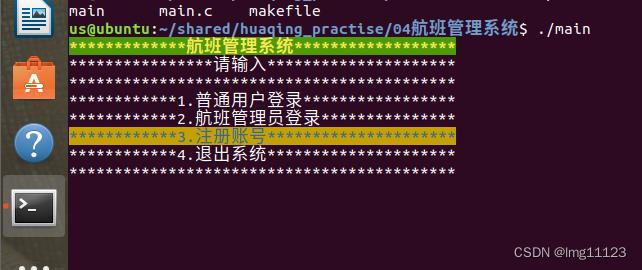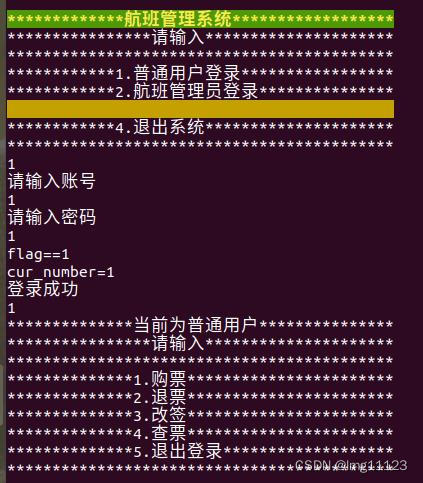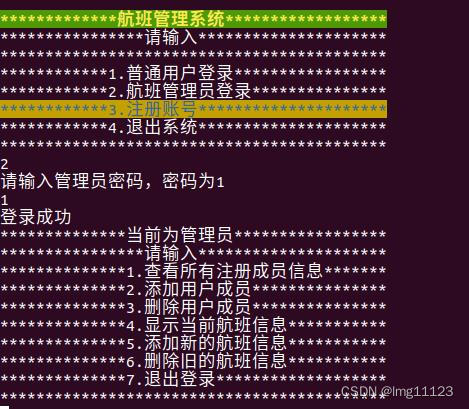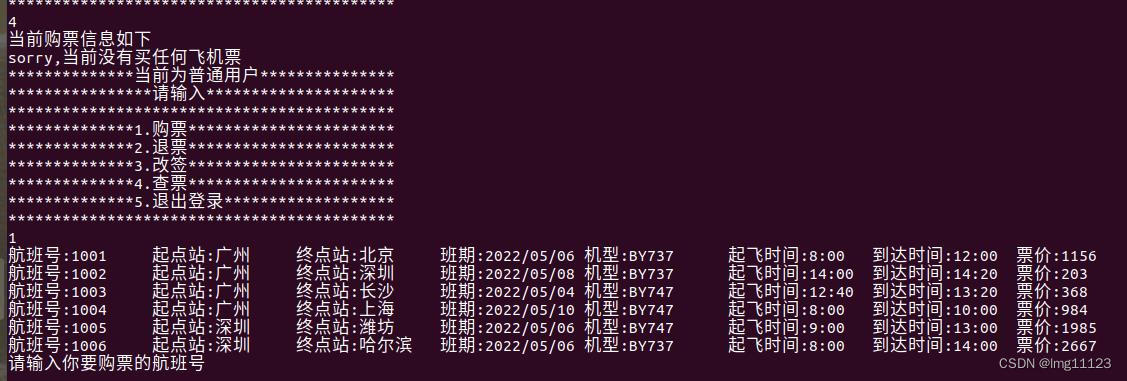该项目使用单向循环链表存放客户端登录信息,用内核链表存放航班信息。通过在单链表中定义指针数组成员来关联两个链表的信息;
功能:有登录及注册界面,如果没有账号则需要注册。登录模块分为普通用户登录以及管理员登录,管理员界面权限更高,功能更丰富,可以强行操作普通用户的所有消息,包括添加新用户,删除用户,修改用户购票信息,查询用户账号密码,查询用户购票信息,查询当前所有航班,添加新的航班,删除航班等。由于项目使用的是纯链表,没有使用到数据库,因此特地初始化了六张航票信息。如需体验更多行班票,可自行在初始化那一块添加。
作为入门的第一个小项目,代码能力肯定没有那些大神牛逼,并且由于时间有限,这个项目我一共做了两天,还有一些功能没写全,比如链表的排序,还有一些输入限制我没加上,比如int类型不允许输入字符,界面也没花时间去做,就将就看看,其他功能基本上没什么问题。下面是项目界面演示及源码展示。
测试环境: Ubuntu18.04
写代码不易 转载请标明作者
登录界面

普通用户界面

管理员界面

航班信息

makefile
main:*.c *.h
gcc -o $@ $^
main.c
#include"double_list.h"
#include"single_list.h"
void menu_print(void);
int usr_login(sg_list* head);
int root_login(void);
void jiemian1(sg_list* head,link* flight_head);
void jiemian2(sg_list* head,link* flight_head);
void jiemian3(sg_list* head);
void single_list_del(sg_list* head);
char cur_number[20]="-1";
void menu_print(void)
{
//printf("\033[1m\033[45;33m HELLO_WORLD \033[0m\n");
printf("\033[1m\033[42;33m*************航班管理系统******************\033[0m\n");
printf("****************请输入*********************\n");
printf("*******************************************\n");
printf("************1.普通用户登录*****************\n");
printf("************2.航班管理员登录***************\n");
printf("\033[5m\033[43;34m************3.注册账号*********************\033[0m\n");//
printf("************4.退出系统*********************\n");//
printf("*******************************************\n");
}
int usr_login(sg_list* head)
{
sg_list* p=head->next;
struct usr_data temp;
printf("请输入账号\n");
scanf("%s",temp.num);
while(getchar()!='\n');
printf("请输入密码\n");
scanf("%s",temp.password);
while(getchar()!='\n');
int flag=0; //账号查询成功标志位,1为成功;
while(p!=head)
{
if(strcmp(p->data.num,temp.num)==0)
{
flag=1;
break;
}
p=p->next;
}
if(flag==0)
{
return -1;
// printf("当前账号不存在\n");
}
else if(flag==1)
{
if(strcmp(p->data.password,temp.password)!=0)
{
return -2;
// printf("密码错误\n");
}else
strcpy(cur_number,p->data.num);
return 1; //登录成功
}
}
int root_login(void)
{
int password=1;
int temp=0;
printf("请输入管理员密码,密码为1\n");
scanf("%d",&temp);
while(getchar()!='\n');
if(password==temp)
return 1;
else
return -1;
}
void jiemian1(sg_list* head,link* flight_head) //普通用户
{
link* flight_temp;
sg_list* list_temp;
int del_flag=0,fflag=0;
while(1)
{
int select;
printf("**************当前为普通用户***************\n");
printf("****************请输入*********************\n");
printf("*******************************************\n");
printf("**************1.购票***********************\n");
printf("**************2.退票***********************\n");
printf("**************3.改签***********************\n");
printf("**************4.查票***********************\n");
printf("**************5.退出登录*******************\n");
printf("*******************************************\n");
scanf("%d",&select);
switch(select)
{
case 1:
list_head_print(flight_head);
printf("请输入你要购票的航班号\n");
int num;
scanf("%d",&num);
while(getchar()!='\n');
printf("\n");
list_head_print(flight_head);
flight_temp=flight_find_num_data(flight_head,num);//航班的节点
if(flight_temp==NULL)
{
printf("没有找到该航班请重新购票\n");
break;
}
list_temp=single_list_num_find(head,cur_number);//找到当前登录的用户链表节点
if(list_temp==NULL)
{
printf("用户名错误请即使联系程序员修改全局cur_number[20]\n");
printf("%s\n",cur_number);
break;
}
// link* qqq;
list_temp->data.data[list_temp->data.ticket_number]=flight_temp;
flight_temp->data.flag++;
// *(list_temp->data.data+list_temp->data.ticket_number)=qqq;
// *((list_temp->data).data+0)=qqq;
(list_temp->data.ticket_number)++;
printf("购票成功当前购票信息为:\n");
list_node_print(flight_temp);
break;
case 2:
list_temp=single_list_num_find(head,cur_number);
if(list_temp->data.ticket_number==0)
{
printf("当前没买任何票,无法退票\n");
break;
}
printf("请输入你要退票票的航班号\n");
char num1[18];
int ii;
scanf("%s",num1);
while(getchar()!='\n');
del_flag=0;
//printf("list_temp->data.ticket_number=%d\n",list_temp->data.ticket_number);
for(ii=0;ii<(list_temp->data.ticket_number);ii++)
{
if((del_flag==0)&&strcmp((list_temp->data.data[ii])->data.number,num1)==0)
{
list_temp->data.data[ii]->data.flag--;
printf("退票成功,支付宝到账%d元\n",list_temp->data.data[ii]->data.value);
// list_temp->data.data[ii]=NULL;
// list_node_print(list_temp->data.data[ii]);
// printf("list_temp->data.data[ii]->data->number=%s\n",list_temp->data.data[ii]->data.number);
// list_node_print(list_temp->data.data[ii]);
del_flag=1;
}
if(del_flag==1&&ii!=list_temp->data.ticket_number-1)
{
list_temp->data.data[ii]=list_temp->data.data[ii+1];
}
}
if(del_flag==1)
{
// printf("退票成功\n");
list_temp->data.ticket_number--;
}
else
printf("没有找到该票\n");
del_flag=0;
break;//退票
case 3:
list_temp=single_list_num_find(head,cur_number);//得到用户节点
if(list_temp->data.ticket_number==0)
{
printf("当前没买任何票,无法退票\n");
break;
}
printf("请输入你要更换的航班号\n");
char num2[18];
int iii;
scanf("%s",num2);
while(getchar()!='\n');
printf("请输入你更换后的航班号\n");
char num3[18];
scanf("%s",num3);
while(getchar()!='\n');
fflag=0;
for(iii=0;iii<(list_temp->data.ticket_number);iii++)
{
if(strcmp((list_temp->data.data[iii])->data.number,num2)==0)
{
if(flight_find_num_data(flight_head,atoi(num3))==NULL)
{
printf("输入的飞机票不存在\n");
break;
}
list_temp->data.data[iii]->data.flag--;
list_temp->data.data[iii]=flight_find_num_data(flight_head,atoi(num3));
list_temp->data.data[iii]->data.flag++;
printf("换票成功,请自觉补差价\n");
fflag=1;
break;
}
}
if(fflag==0)
{
printf("改签失败,当前账户并没有该飞机票,无法换票\n");
}
break;
case 4:
printf("当前购票信息如下\n");
list_temp=single_list_num_find(head,cur_number);
if(list_temp==NULL)
{
printf("sorry,没找到cur_number:%s的用户\n",cur_number);
break;
}
if(list_temp->data.ticket_number==0)
{
printf("sorry,当前没有买任何飞机票\n");
}
for(int i=0;i<list_temp->data.ticket_number;i++)
{
list_node_print(list_temp->data.data[i]);
}
break;//查票
case 5:
strcpy(cur_number,"-1");
return;//返回上一级
}
}
}
void jiemian2_menu(void)
{
printf("**************当前为管理员*****************\n");
printf("****************请输入*********************\n");
printf("**************1.查看所有注册成员信息*******\n");
printf("**************2.添加用户成员***************\n");
printf("**************3.删除用户成员***************\n");
printf("**************4.显示当前航班信息***********\n");
printf("**************5.添加新的航班信息***********\n");
printf("**************6.删除旧的航班信息***********\n");
printf("**************7.退出登录*******************\n");
printf("*******************************************\n");
}
void jiemian2(sg_list* head,link* flight_head) //管理员功能
{
jiemian2_menu();
int select=0;
char num_temp[18];
while(1)
{
scanf("%d",&select);
switch(select)
{
case 1: single_list_print(head); break;
case 2: jiemian3(head); break;
case 3:
jiemian2_menu();
single_list_del(head); break;
case 4:
list_head_print(flight_head);
break; //显示当前航班信息
case 5:
flight_data_insert(flight_head);
break;//添加航班信息
case 6:
list_head_print(flight_head);
printf("请输入要删除的航班号\n");
scanf("%s",num_temp);
while(getchar()!='\n');
list_del_data(flight_head,num_temp);
break;//删除航班信息
case 7:
return;
}
jiemian2_menu();
}
}
void jiemian3(sg_list* head)
{
printf("************当前为注册账号界面*************\n");
printf("**************请输入用户名*****************\n");
struct usr_data data;
data.key=1;
data.ticket_number=0;
scanf("%s",data.name);
while(getchar()!='\n');
printf("**************请输入账号*******************\n");
scanf("%s",data.num);
while(getchar()!='\n');
printf("**************请输入密码*******************\n");
scanf("%s",data.password);
while(getchar()!='\n');
single_list_head_insert(head,data);
printf("*******************************************\n");
printf("********注册成功你的账号信息如下***********\n");
printf("usr->name=%-10s\tusr->num=%s\tusr->password=%s\tkey=%d\tticket_number=%d\t\n",data.name,data.num,data.password,data.key,data.ticket_number);
}
void single_list_del(sg_list* head)
{
printf("***请选择你要删除的用户名或账号***\n******1.用户名******\n******2.账号******\n");
int select=0;
char name_num_data[20];
scanf("%d",&select);
while(getchar()!='\n');
if(select!=1&&select!=2)
{
printf("输入范围错误\n");
return;
}
printf("请输入你要删除的内容\n");
scanf("%s",name_num_data);
while(getchar()!='\n');
sg_list* p=head->next;
sg_list* prev=head;
while(p!=head)
{
printf("usr->name=%-10s\tusr->num=%s\tusr->password=%s\tkey==%d\t\n",p->data.name,p->data.num,p->data.password,p->data.key);
#if 1
if(select==1)
{
if(strcmp(p->data.name,name_num_data)==0)
{
prev->next=p->next;
free(p);
p=NULL;
printf("用户名为%s的用户已删除\n",name_num_data);
return;
}
if(p==head)
{
printf("当前用户不存在\n");return;
}
}
else if(select==2)
{
if(strcmp(p->data.num,name_num_data)==0)
{
prev->next=p->next;
free(p);
p=NULL;
printf("账号为%s的用户已删除\n",name_num_data);
return;
}
if(p==head)
{
printf("当前账号不存在\n");return;
}
}
else
{
printf("输入范围错误\n");
return;
}
#endif
p=p->next;
prev=prev->next;
}
}
int main(void)
{
int jiemian;//1为普通用户登录界面 2为航班管理员登录界面 3为注册账号 4.为退出系统
int ret=0;
sg_list* head;
single_list_init(&head);
link* flight_head;
link_init(&flight_head);
flight_datainit(flight_head);
while(1)
{
#if 1
menu_print();
scanf("%d",&jiemian);
while(getchar()!='\n');
switch(jiemian)
{
case 1:
ret=usr_login(head);
if(ret==-1)
{
printf("该账号不存在\n");
break;
}
else if(ret==-2)
{
printf("密码错误\n");
break;
}
else if(ret==1);
{
printf("登录成功\n");
jiemian1(head,flight_head);
}
break;//普通用户
case 2:
ret=root_login();
if(ret==1)
{
printf("登录成功\n");
jiemian2(head,flight_head);
}
else if(ret==-1)
{
printf("密码错误\n");
break;
}
break;//管理员
case 3:jiemian3(head);break;//注册账号
case 4:return 0;break;//退出系统
}
single_list_print(head);
#endif
}
single_list.c
#include"single_list.h"
void single_list_init(sg_list** head)
{
*head=(sg_list*)malloc(sizeof(sg_list));
(*head)->next=*head;
}
void single_list_head_insert(sg_list* head,struct usr_data data)
{
sg_list* node=(sg_list*)malloc(sizeof(sg_list));
node->data=data;
node->next=head->next;
head->next=node;
}
void single_list_print(sg_list* head)
{
sg_list* temp=head->next;
while(temp!=head)
{
printf("usr->name=%-10s\tusr->num=%s\tusr->password=%s\tkey==%d\t",(temp->data.name),(temp->data.num),(temp->data.password),temp->data.key);
printf("\n");
temp=temp->next;
}
printf("\n");
}
sg_list* single_list_num_find(sg_list* head,char num[20])
{
sg_list* temp=head->next;
while(temp!=head)
{
if(strcmp(num,temp->data.num)==0)
{
return temp;
}
temp=temp->next;
}
return NULL;
}
}
single_list.h
#ifndef _SINGLE_LIST_H
#define _SINGLE_LIST_H
#include<stdlib.h>
#include<stdio.h>
#include<string.h>
#include"double_list.h"
struct usr_data //用户信息
{
char name[20];
char num[20];
char password[20];
char key; //0为管理员权限,1为普通用户
link* data[5];//节点地址
int ticket_number; //当前用户票数
};
typedef struct SINGLE_LIST //用户信息的单向循环链表
{
struct usr_data data;
struct SINGLE_LIST* next;
}sg_list;
void single_list_init(sg_list** head);
void single_list_head_insert(sg_list* head,struct usr_data data);
void single_list_print(sg_list* head);
sg_list* single_list_num_find(sg_list* head,char num[20]);
#endif
double_list.c
//内核双向循环链表
#include"double_list.h"
void link_init(link** head) //初始化表头
{
*head =(link*)malloc(sizeof(link));
INIT_LIST_HEAD(&((*head)->list));
}
void list_head_insert(link* head,struct flight_data data) //头插
{
link* node=(link*)malloc(sizeof(link));
node->data=data;
list_add(&node->list, &head->list);
}
void list_end_insert(link* head,struct flight_data data) //尾插
{
link* node=(link*)malloc(sizeof(link));
node->data=data;
list_add_tail(&node->list,&head->list);
}
void list_head_print(link* head) //从头打印
{
link* pos;
list_for_each_entry(pos, &head->list,list)
{
printf("航班号:%s\t起点站:%s\t终点站:%s\t班期:%s\t机型:%s\t起飞时间:%s\t到达时间:%s\t票价:%d\t",pos->data.number,pos->data.staddress,pos->data.arraddress,pos->data.DATE,pos->data.TYPE,pos->data.stime,pos->data.atime,pos->data.value);
printf("\n");
}
}
void list_node_print(link* node)
{
link* pos=node;
printf("航班号:%s\t起点站:%s\t终点站:%s\t班期:%s\t机型:%s\t起飞时间:%s\t到达时间:%s\t票价:%d\t",pos->data.number,pos->data.staddress,pos->data.arraddress,pos->data.DATE,pos->data.TYPE,pos->data.stime,pos->data.atime,pos->data.value);
printf("\n");
}
void flight_data_insert(link* head)
{
struct flight_data data;
data.flag=0;
printf("请输入航班号\n");
scanf("%s",data.number);
while(getchar()!='\n');
printf("请输入起点站\n");
scanf("%s",data.staddress);
while(getchar()!='\n');
printf("请输入终点站\n");
scanf("%s",data.arraddress);
while(getchar()!='\n');
printf("请输入班期\n");
scanf("%s",data.DATE);
while(getchar()!='\n');
printf("请输入机型 \n");
scanf("%s",data.TYPE);
while(getchar()!='\n');
printf("请输入起飞时间\n");
scanf("%s",data.stime);
while(getchar()!='\n');
printf("请输入到达时间\n");
scanf("%s",data.atime);
while(getchar()!='\n');
printf("请输入票价\n");
scanf("%d",&data.value);
while(getchar()!='\n');
list_end_insert(head,data);
// printf("航班号:%s\t起点站:%s\t终点站:%s\t班期:%s\t机型:%s\t起飞时间:%s\t到达时间:%s\t票价:%d\t",data.number,data.staddress,data.arraddress,data.DATE,data.TYPE,data.stime,data.atime,data.value);
printf("\n");
}
void list_del_data(link* head,char number[18]) //查找内容并删除
{
link* pos;
list_for_each_entry(pos, &head->list,list)
{
if(!strcmp(pos->data.number,number)) 用strcmp判断
{
if(pos->data.flag!=0)
{
printf("请先把用户购买的飞机票退票后再删除\n");
return;
}
list_del_init(&pos->list);
printf("删除成功\n");
list_head_print(head);
return; //只能删除一个,就把pos初始化
// __list_del_entry(&pos->list); //全部删除
}
}
}
void flight_data_del(link* head)
{
char number[18];
printf("请输入要删除的航班号\n");
scanf("%s",number);
while(getchar()!='\n');
list_del_data(head,number);
}
void flight_datainit(link* head)
{
struct flight_data data;
data.flag=0;
strcpy(data.number,"1001");strcpy(data.staddress,"广州");
strcpy(data.arraddress,"北京");strcpy(data.DATE,"2022/05/06");
strcpy(data.TYPE,"BY737");strcpy(data.stime,"8:00");
strcpy(data.atime,"12:00");data.value=1156;
list_end_insert(head,data);
strcpy(data.number,"1002");strcpy(data.staddress,"广州");
strcpy(data.arraddress,"深圳");strcpy(data.DATE,"2022/05/08");
strcpy(data.TYPE,"BY737");strcpy(data.stime,"14:00");
strcpy(data.atime,"14:20");data.value=203;
list_end_insert(head,data);
strcpy(data.number,"1003");strcpy(data.staddress,"广州");
strcpy(data.arraddress,"长沙");strcpy(data.DATE,"2022/05/04");
strcpy(data.TYPE,"BY747");strcpy(data.stime,"12:40");
strcpy(data.atime,"13:20");data.value=368;
list_end_insert(head,data);
strcpy(data.number,"1004");strcpy(data.staddress,"广州");
strcpy(data.arraddress,"上海");strcpy(data.DATE,"2022/05/10");
strcpy(data.TYPE,"BY747");strcpy(data.stime,"8:00");
strcpy(data.atime,"10:00");data.value=984;
list_end_insert(head,data);
strcpy(data.number,"1005");strcpy(data.staddress,"深圳");
strcpy(data.arraddress,"潍坊");strcpy(data.DATE,"2022/05/06");
strcpy(data.TYPE,"BY747");strcpy(data.stime,"9:00");
strcpy(data.atime,"13:00");data.value=1985;
list_end_insert(head,data);
strcpy(data.number,"1006");strcpy(data.staddress,"深圳");
strcpy(data.arraddress,"哈尔滨");strcpy(data.DATE,"2022/05/06");
strcpy(data.TYPE,"BY737");strcpy(data.stime,"8:00");
strcpy(data.atime,"14:00");data.value=2667;
list_end_insert(head,data);
}
link* flight_find_num_data(link* head,int num)
{
link* pos;
list_for_each_entry(pos, &head->list,list)
{
if(num==atoi(pos->data.number))
{
return pos;
}
}
return NULL;
}
void flight_double_list(void)
{
link* head =(link*)malloc(sizeof(link));
link_init(&head);
// data.number="1001";data.staddress="广州";data.arraddress="北京";
// data.DATE="2022/05/06";data.TYPE="BY737";data.stime="8:00";
// data.atime="12:00";
flight_datainit(head);
list_head_print(head);
printf("********************\n");
while(1)
{
flight_data_insert(head);
list_head_print(head);
flight_data_insert(head);
list_head_print(head);
flight_data_del(head);
list_head_print(head);
}
}double_list.h
#ifndef _DOUBLE_LIST_H
#define _DOUBLE_LIST_H
#include<stdio.h>
#include"list.h"
#include<stdlib.h>
#include<string.h>
struct flight_data //航班信息数据结构
{
char number[18]; //航班号
char staddress[18]; //起点站
char arraddress[18]; //终点站
char DATE[12]; //班期
char TYPE[8]; //机型
char stime[10]; //起飞时间
char atime[10]; //到达时间
int value; //票价
int flag; //买票标志位
};
/**
*从尾查找
*
*/
#define list_end_for_each_entry(pos, head,member) \
for (pos = list_entry((head)->prev, typeof(*pos), list);\
&pos->member != (head);\
pos = list_entry(pos->member.prev, typeof(*pos), member))
typedef struct LINK
{
struct flight_data data;
struct list_head list;
}link;
void link_init(link** head); //初始化表头
void list_head_insert(link* head,struct flight_data data); //头插
void list_end_insert(link* head,struct flight_data data); //尾插
void list_head_print(link* head); //从头打印
void list_final_print(link* head); //从尾打印
void list_del_data(link* head,char number[18]); //查找内容并删除
void list_change_data(link* head,int new_data,int old_data,int mode);//查找替换,mode=1为单个替换,mode=2为全部替换
void flight_datainit(link* head);
void flight_double_list(void);
void flight_data_insert(link* head);
link* flight_find_num_data(link* head,int num);
void list_node_print(link* node);//打印单个结点信息
#endiflist.h
#ifndef _LINUX_LIST_H
#define _LINUX_LIST_H
/*
* Simple doubly linked list implementation.
*
* Some of the internal functions ("__xxx") are useful when
* manipulating whole lists rather than single entries, as
* sometimes we already know the next/prev entries and we can
* generate better code by using them directly rather than
* using the generic single-entry routines.
*/
struct list_head{
struct list_head *next,*prev;
};
#define LIST_POISON1 ((void *) 0x00100100 + 0)
#define LIST_POISON2 ((void *) 0x00200200 + 0)
#define offsetof(TYPE, MEMBER) ((size_t) &((TYPE *)0)->MEMBER)
#define container_of(ptr, type, member) ({ \
const typeof( ((type *)0)->member ) *__mptr = (ptr); \
(type *)( (char *)__mptr - offsetof(type,member) );})
#define LIST_HEAD_INIT(name) { &(name), &(name) }
#define LIST_HEAD(name) \
struct list_head name = LIST_HEAD_INIT(name)
static inline void INIT_LIST_HEAD(struct list_head *list)
{
list->next = list;
list->prev = list;
}
/*
* Insert a new entry between two known consecutive entries.
*
* This is only for internal list manipulation where we know
* the prev/next entries already!
*/
#ifndef CONFIG_DEBUG_LIST
static inline void __list_add(struct list_head *new,
struct list_head *prev,
struct list_head *next)
{
next->prev = new;
new->next = next;
new->prev = prev;
prev->next = new;
}
#else
extern void __list_add(struct list_head *new,
struct list_head *prev,
struct list_head *next);
#endif
/**
* list_add - add a new entry
* @new: new entry to be added
* @head: list head to add it after
*
* Insert a new entry after the specified head.
* This is good for implementing stacks.
*/
static inline void list_add(struct list_head *new, struct list_head *head)
{
__list_add(new, head, head->next);
}
/**
* list_add_tail - add a new entry
* @new: new entry to be added
* @head: list head to add it before
*
* Insert a new entry before the specified head.
* This is useful for implementing queues.
*/
static inline void list_add_tail(struct list_head *new, struct list_head *head)
{
__list_add(new, head->prev, head);
}
/*
* Delete a list entry by making the prev/next entries
* point to each other.
*
* This is only for internal list manipulation where we know
* the prev/next entries already!
*/
static inline void __list_del(struct list_head * prev, struct list_head * next)
{
next->prev = prev;
prev->next = next;
}
/**
* list_del - deletes entry from list.
* @entry: the element to delete from the list.
* Note: list_empty() on entry does not return true after this, the entry is
* in an undefined state.
*/
#ifndef CONFIG_DEBUG_LIST
static inline void __list_del_entry(struct list_head *entry)
{
__list_del(entry->prev, entry->next);
}
static inline void list_del(struct list_head *entry)
{
__list_del(entry->prev, entry->next);
entry->next = LIST_POISON1;
entry->prev = LIST_POISON2;
}
#else
extern void __list_del_entry(struct list_head *entry);
extern void list_del(struct list_head *entry);
#endif
/**
* list_replace - replace old entry by new one
* @old : the element to be replaced
* @new : the new element to insert
*
* If @old was empty, it will be overwritten.
*/
static inline void list_replace(struct list_head *old,
struct list_head *new)
{
new->next = old->next;
new->next->prev = new;
new->prev = old->prev;
new->prev->next = new;
}
static inline void list_replace_init(struct list_head *old,
struct list_head *new)
{
list_replace(old, new);
INIT_LIST_HEAD(old);
}
/**
* list_del_init - deletes entry from list and reinitialize it.
* @entry: the element to delete from the list.
*/
static inline void list_del_init(struct list_head *entry)
{
__list_del_entry(entry);
INIT_LIST_HEAD(entry);
}
/**
* list_move - delete from one list and add as another's head
* @list: the entry to move
* @head: the head that will precede our entry
*/
static inline void list_move(struct list_head *list, struct list_head *head)
{
__list_del_entry(list);
list_add(list, head);
}
/**
* list_move_tail - delete from one list and add as another's tail
* @list: the entry to move
* @head: the head that will follow our entry
*/
static inline void list_move_tail(struct list_head *list,
struct list_head *head)
{
__list_del_entry(list);
list_add_tail(list, head);
}
/**
* list_is_last - tests whether @list is the last entry in list @head
* @list: the entry to test
* @head: the head of the list
*/
static inline int list_is_last(const struct list_head *list,
const struct list_head *head)
{
return list->next == head;
}
/**
* list_empty - tests whether a list is empty
* @head: the list to test.
*/
static inline int list_empty(const struct list_head *head)
{
return head->next == head;
}
/**
* list_empty_careful - tests whether a list is empty and not being modified
* @head: the list to test
*
* Description:
* tests whether a list is empty _and_ checks that no other CPU might be
* in the process of modifying either member (next or prev)
*
* NOTE: using list_empty_careful() without synchronization
* can only be safe if the only activity that can happen
* to the list entry is list_del_init(). Eg. it cannot be used
* if another CPU could re-list_add() it.
*/
static inline int list_empty_careful(const struct list_head *head)
{
struct list_head *next = head->next;
return (next == head) && (next == head->prev);
}
/**
* list_rotate_left - rotate the list to the left
* @head: the head of the list
*/
static inline void list_rotate_left(struct list_head *head)
{
struct list_head *first;
if (!list_empty(head)) {
first = head->next;
list_move_tail(first, head);
}
}
/**
* list_is_singular - tests whether a list has just one entry.
* @head: the list to test.
*/
static inline int list_is_singular(const struct list_head *head)
{
return !list_empty(head) && (head->next == head->prev);
}
static inline void __list_cut_position(struct list_head *list,
struct list_head *head, struct list_head *entry)
{
struct list_head *new_first = entry->next;
list->next = head->next;
list->next->prev = list;
list->prev = entry;
entry->next = list;
head->next = new_first;
new_first->prev = head;
}
/**
* list_cut_position - cut a list into two
* @list: a new list to add all removed entries
* @head: a list with entries
* @entry: an entry within head, could be the head itself
* and if so we won't cut the list
*
* This helper moves the initial part of @head, up to and
* including @entry, from @head to @list. You should
* pass on @entry an element you know is on @head. @list
* should be an empty list or a list you do not care about
* losing its data.
*
*/
static inline void list_cut_position(struct list_head *list,
struct list_head *head, struct list_head *entry)
{
if (list_empty(head))
return;
if (list_is_singular(head) &&
(head->next != entry && head != entry))
return;
if (entry == head)
INIT_LIST_HEAD(list);
else
__list_cut_position(list, head, entry);
}
static inline void __list_splice(const struct list_head *list,
struct list_head *prev,
struct list_head *next)
{
struct list_head *first = list->next;
struct list_head *last = list->prev;
first->prev = prev;
prev->next = first;
last->next = next;
next->prev = last;
}
/**
* list_splice - join two lists, this is designed for stacks
* @list: the new list to add.
* @head: the place to add it in the first list.
*/
static inline void list_splice(const struct list_head *list,
struct list_head *head)
{
if (!list_empty(list))
__list_splice(list, head, head->next);
}
/**
* list_splice_tail - join two lists, each list being a queue
* @list: the new list to add.
* @head: the place to add it in the first list.
*/
static inline void list_splice_tail(struct list_head *list,
struct list_head *head)
{
if (!list_empty(list))
__list_splice(list, head->prev, head);
}
/**
* list_splice_init - join two lists and reinitialise the emptied list.
* @list: the new list to add.
* @head: the place to add it in the first list.
*
* The list at @list is reinitialised
*/
static inline void list_splice_init(struct list_head *list,
struct list_head *head)
{
if (!list_empty(list)) {
__list_splice(list, head, head->next);
INIT_LIST_HEAD(list);
}
}
/**
* list_splice_tail_init - join two lists and reinitialise the emptied list
* @list: the new list to add.
* @head: the place to add it in the first list.
*
* Each of the lists is a queue.
* The list at @list is reinitialised
*/
static inline void list_splice_tail_init(struct list_head *list,
struct list_head *head)
{
if (!list_empty(list)) {
__list_splice(list, head->prev, head);
INIT_LIST_HEAD(list);
}
}
/**
* list_entry - get the struct for this entry
* @ptr: the &struct list_head pointer.
* @type: the type of the struct this is embedded in.
* @member: the name of the list_struct within the struct.
*/
#define list_entry(ptr, type, member) \
container_of(ptr, type, member)
/**
* list_first_entry - get the first element from a list
* @ptr: the list head to take the element from.
* @type: the type of the struct this is embedded in.
* @member: the name of the list_struct within the struct.
*
* Note, that list is expected to be not empty.
*/
#define list_first_entry(ptr, type, member) \
list_entry((ptr)->next, type, member)
/**
* list_for_each - iterate over a list
* @pos: the &struct list_head to use as a loop cursor.
* @head: the head for your list.
*/
#define list_for_each(pos, head) \
for (pos = (head)->next; pos != (head); pos = pos->next)
/**
* __list_for_each - iterate over a list
* @pos: the &struct list_head to use as a loop cursor.
* @head: the head for your list.
*
* This variant doesn't differ from list_for_each() any more.
* We don't do prefetching in either case.
*/
#define __list_for_each(pos, head) \
for (pos = (head)->next; pos != (head); pos = pos->next)
/**
* list_for_each_prev - iterate over a list backwards
* @pos: the &struct list_head to use as a loop cursor.
* @head: the head for your list.
*/
#define list_for_each_prev(pos, head) \
for (pos = (head)->prev; pos != (head); pos = pos->prev)
/**
* list_for_each_safe - iterate over a list safe against removal of list entry
* @pos: the &struct list_head to use as a loop cursor.
* @n: another &struct list_head to use as temporary storage
* @head: the head for your list.
*/
#define list_for_each_safe(pos, n, head) \
for (pos = (head)->next, n = pos->next; pos != (head); \
pos = n, n = pos->next)
/**
* list_for_each_prev_safe - iterate over a list backwards safe against removal of list entry
* @pos: the &struct list_head to use as a loop cursor.
* @n: another &struct list_head to use as temporary storage
* @head: the head for your list.
*/
#define list_for_each_prev_safe(pos, n, head) \
for (pos = (head)->prev, n = pos->prev; \
pos != (head); \
pos = n, n = pos->prev)
/**
* list_for_each_entry - iterate over list of given type
* @pos: the type * to use as a loop cursor.
* @head: the head for your list.
* @member: the name of the list_struct within the struct.
*/
#define list_for_each_entry(pos, head, member) \
for (pos = list_entry((head)->next, typeof(*pos), member); \
&pos->member != (head); \
pos = list_entry(pos->member.next, typeof(*pos), member))
/**
* list_for_each_entry_reverse - iterate backwards over list of given type.
* @pos: the type * to use as a loop cursor.
* @head: the head for your list.
* @member: the name of the list_struct within the struct.
*/
#define list_for_each_entry_reverse(pos, head, member) \
for (pos = list_entry((head)->prev, typeof(*pos), member); \
&pos->member != (head); \
pos = list_entry(pos->member.prev, typeof(*pos), member))
/**
* list_prepare_entry - prepare a pos entry for use in list_for_each_entry_continue()
* @pos: the type * to use as a start point
* @head: the head of the list
* @member: the name of the list_struct within the struct.
*
* Prepares a pos entry for use as a start point in list_for_each_entry_continue().
*/
#define list_prepare_entry(pos, head, member) \
((pos) ? : list_entry(head, typeof(*pos), member))
/**
* list_for_each_entry_continue - continue iteration over list of given type
* @pos: the type * to use as a loop cursor.
* @head: the head for your list.
* @member: the name of the list_struct within the struct.
*
* Continue to iterate over list of given type, continuing after
* the current position.
*/
#define list_for_each_entry_continue(pos, head, member) \
for (pos = list_entry(pos->member.next, typeof(*pos), member); \
&pos->member != (head); \
pos = list_entry(pos->member.next, typeof(*pos), member))
/**
* list_for_each_entry_continue_reverse - iterate backwards from the given point
* @pos: the type * to use as a loop cursor.
* @head: the head for your list.
* @member: the name of the list_struct within the struct.
*
* Start to iterate over list of given type backwards, continuing after
* the current position.
*/
#define list_for_each_entry_continue_reverse(pos, head, member) \
for (pos = list_entry(pos->member.prev, typeof(*pos), member); \
&pos->member != (head); \
pos = list_entry(pos->member.prev, typeof(*pos), member))
/**
* list_for_each_entry_from - iterate over list of given type from the current point
* @pos: the type * to use as a loop cursor.
* @head: the head for your list.
* @member: the name of the list_struct within the struct.
*
* Iterate over list of given type, continuing from current position.
*/
#define list_for_each_entry_from(pos, head, member) \
for (; &pos->member != (head); \
pos = list_entry(pos->member.next, typeof(*pos), member))
/**
* list_for_each_entry_safe - iterate over list of given type safe against removal of list entry
* @pos: the type * to use as a loop cursor.
* @n: another type * to use as temporary storage
* @head: the head for your list.
* @member: the name of the list_struct within the struct.
*/
#define list_for_each_entry_safe(pos, n, head, member) \
for (pos = list_entry((head)->next, typeof(*pos), member), \
n = list_entry(pos->member.next, typeof(*pos), member); \
&pos->member != (head); \
pos = n, n = list_entry(n->member.next, typeof(*n), member))
/**
* list_for_each_entry_safe_continue - continue list iteration safe against removal
* @pos: the type * to use as a loop cursor.
* @n: another type * to use as temporary storage
* @head: the head for your list.
* @member: the name of the list_struct within the struct.
*
* Iterate over list of given type, continuing after current point,
* safe against removal of list entry.
*/
#define list_for_each_entry_safe_continue(pos, n, head, member) \
for (pos = list_entry(pos->member.next, typeof(*pos), member), \
n = list_entry(pos->member.next, typeof(*pos), member); \
&pos->member != (head); \
pos = n, n = list_entry(n->member.next, typeof(*n), member))
/**
* list_for_each_entry_safe_from - iterate over list from current point safe against removal
* @pos: the type * to use as a loop cursor.
* @n: another type * to use as temporary storage
* @head: the head for your list.
* @member: the name of the list_struct within the struct.
*
* Iterate over list of given type from current point, safe against
* removal of list entry.
*/
#define list_for_each_entry_safe_from(pos, n, head, member) \
for (n = list_entry(pos->member.next, typeof(*pos), member); \
&pos->member != (head); \
pos = n, n = list_entry(n->member.next, typeof(*n), member))
/**
* list_for_each_entry_safe_reverse - iterate backwards over list safe against removal
* @pos: the type * to use as a loop cursor.
* @n: another type * to use as temporary storage
* @head: the head for your list.
* @member: the name of the list_struct within the struct.
*
* Iterate backwards over list of given type, safe against removal
* of list entry.
*/
#define list_for_each_entry_safe_reverse(pos, n, head, member) \
for (pos = list_entry((head)->prev, typeof(*pos), member), \
n = list_entry(pos->member.prev, typeof(*pos), member); \
&pos->member != (head); \
pos = n, n = list_entry(n->member.prev, typeof(*n), member))
/**
* list_safe_reset_next - reset a stale list_for_each_entry_safe loop
* @pos: the loop cursor used in the list_for_each_entry_safe loop
* @n: temporary storage used in list_for_each_entry_safe
* @member: the name of the list_struct within the struct.
*
* list_safe_reset_next is not safe to use in general if the list may be
* modified concurrently (eg. the lock is dropped in the loop body). An
* exception to this is if the cursor element (pos) is pinned in the list,
* and list_safe_reset_next is called after re-taking the lock and before
* completing the current iteration of the loop body.
*/
#define list_safe_reset_next(pos, n, member) \
n = list_entry(pos->member.next, typeof(*pos), member)
/*
* Double linked lists with a single pointer list head.
* Mostly useful for hash tables where the two pointer list head is
* too wasteful.
* You lose the ability to access the tail in O(1).
*/
#endif
测试环境: Ubuntu18.04





















 2372
2372











 被折叠的 条评论
为什么被折叠?
被折叠的 条评论
为什么被折叠?








